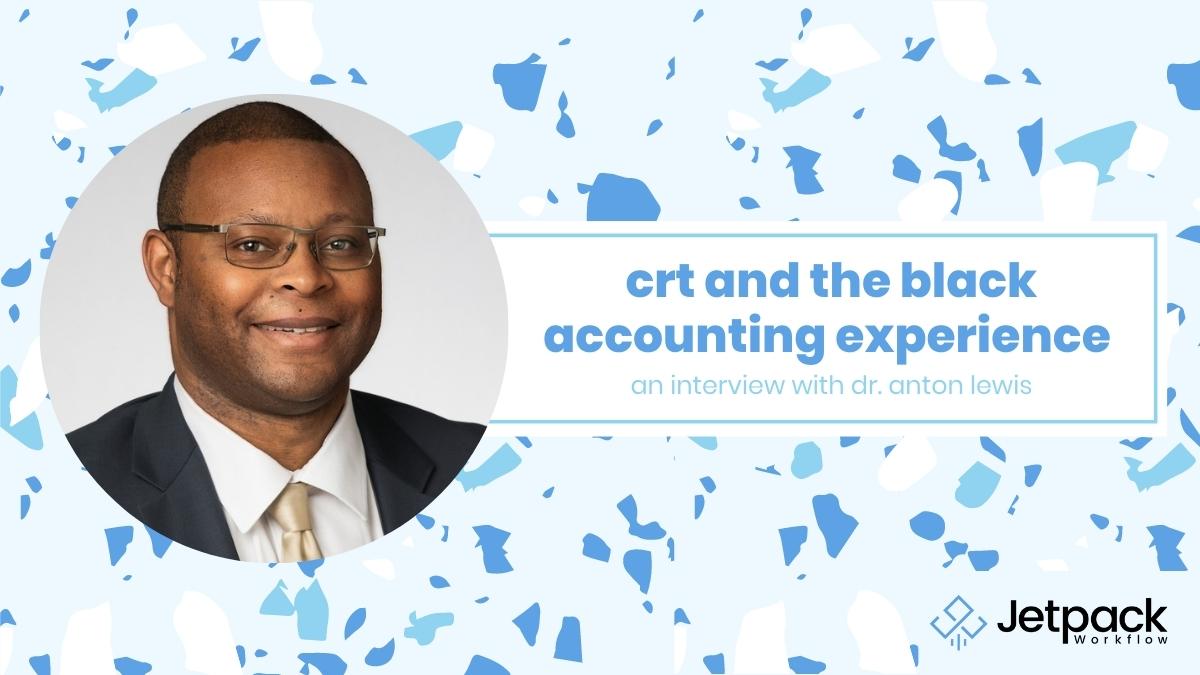CRT and the Black Accounting Experience

Summary
- What is Critical Race Theory?
- Why is there a lack of POC in the accounting industry?
- Incremental Progress
- Recruiting Diversity
- Response to CRT
Additional Resources
Meet Dr. Anton Lewis
Dr. Anton Lewis is a tenured Associate Professor of Accounting at Valparaiso University, where he primarily teaches undergraduate financial accountancy and managerial accountancy, as well undergraduate Audit and Accounting Information Systems classes. Dr. Lewis attended Bangor University, where he earned his BA in Accounting and Finance. He later earned his Ph.D. in Accounting from Leeds Beckett University.
What is Critical Race Theory (CRT)?
Critical Race Theory (CRT), as Dr. Lewis describes it, “is simply acknowledging a truth that race is a feature of our lives, and we should look at that. We should talk about that.” Dr. Lewis stated that CRT is all about coming to realize the centrality of race in our society and then having a conversation about it.
Why is there a lack of POC in the accounting industry?
The AICPA Recent Trends Report states that only 2% of all CPAs in the US are black—even fewer of those CPAs are Partners at just 1%. Professor Teresa Hammond cites some 1997 data in her 2002 book that black CPAs represented under 1 percent of CPAs at the time. “I give you these figures to highlight the longevity of this issue. We’ve had virtually no significant movement over that time, and we realized in the mid 90s, if not way before then, that we have an issue,” explained Dr. Lewis. So, how do we deal with this issue? Dr. Lewis notes that it isn’t that simple, because this is “a longstanding, intractable issue.”
“Our profession exists within society, and society has not had any meaningful handle on this,” Dr. Lewis said. Due to this, it is not unusual to see this same trend across many professions. The question then becomes “What are we doing to keep our house in order?” The first step, as Dr. Lewis mentioned, is to engage in an open and honest conversation about those issues.
Incremental Progress
“Given the recent foire concerning Black Lives Matter, that has firmly put issues of diversity, equity, and inclusion (DEI), particularly where African Americans and other people of color are concerned, on the accounting table.” Dr. Lewis commented that he has seen a couple of the Big Four firms making some impressive announcements concerning this issue. The Chairman of PWC, Tim Ryan, has brought issues of race and racism into focus for the profession to address. In several reports made by PWC, they have set DEI benchmarks for their company. “I should hasten to add that, Tim Ryan, he’s a white male. He is a white man at the top of one of the Big Four accountancy firms and is looking to change this.”
Deloitte has also made significant progress in this area, according to Dr. Lewis. Deloitte has announced that they will put $75M towards improving DEI, particularly for the African American community. They’ve initiated what they call their MADE (Making Accounting Diverse and Equitable) program to help address DEI issues. KPMG and Ernst & Young are also doing similar things but have not been nearly as vocal about their programs. Dr. Lewis also mentioned that there are several Fortune 500 companies that have stated they will contribute a collective $1 billion to deal with DEI issues.
Get everything you need to manage projects and meet deadlines.
Subscribe to our weekly newsletter, and get 32 free accounting workflow templates today!
sign me up!
Recruiting Diversity
In order to recruit more diverse people, you have to buy into the notion that a diverse team is better for you, your company, and your clients. Once you do that, you have to start considering your pipeline. Are you recruiting tactics pulling in diverse applicants? If not, it is helpful to consider why. If you’re a brick-and-mortar shop in a low-diversity area, it may be a little harder to build a diverse team. However, if your business and team work in a remote format, there is less of an excuse for not having a diverse team.
Dr. Lewis noted that diversity at larger institutions has often fallen short, and what he hears from many of those employers is “we just can’t find qualified black applicants to fill that space.” And he stated that this particular line of thinking is a misnomer, because those institutions are recruiting at large Research 1 and Research 2 universities. The problem with this practice is that the Ivy League, R1, and R2 schools are not comprised of a large number of black students. In fact, the number of black students on those campuses is rather miniscule. His response to those institutions that are recruiting from such schools is “You’re recruiting from a small pool to begin with. You have to be more inventive.”
Many small to mid-size firms often wonder to themselves, “If the Big Four can’t get it right, how can I?” That is where most people get it wrong. Dr. Lewis replied that most black CPAs, proto-accountants, and accountancy professionals don’t want to work in one of the Big Four. They don’t necessarily want to work in a large institution. “They want that personal piece. They want to know who they’re managing. They want to have a sense of doing the complete tax process,” Dr. Lewis said. “Because a firm is smaller, you can have a greater interpersonal relationship. You can have deep, more meaningful relationships.” Smaller firms, then, have a much better chance of recruiting a diverse team, provided that you have a diverse pool of applicants to select from. If the sentiment is there, if the drive to make a difference in the profession is there, you will start to see results as time goes on.
Response to CRT
“I exist as the wild man in the wilderness about this,” Dr. Lewis said. “If industry leaders want to talk, they have not spoken to me.” He went on to say that he isn’t seen as an outcast, because for that to happen you have to have a dialogue first. Dr. Lewis shared that his message remaining unheard and this conversation never happening is his biggest fear. There is not enough conversation happening at the corporate level about DEI, and Dr. Lewis commented that accountancy academia is even worse. “Getting published on this is a real problem,” Dr. Lewis shared. “Publishing often means tenure and if the publications don’t take you seriously and the editors say ‘This is not for us,’ that could mean you never get tenure.”
This does not mean that there is no progress being made in the industry. Dr. Lewis has formed the Accounting & Race Forum (ARF). “We are a group of international accounting academics that specifically examine the areas of race and racism,” said Lewis. “We’re not only a network that not only talks about these issues but also writes about these issues.” The ARF also challenges some of the DEI policies produced by the AICPA and the ICAEW without the input of experts in the DEI field.
“We need a much more firm connection between industry and the academia of the accounting industry, specifically as it relates to critical race theory and DEI.” What really needs to happen, according to Dr. Lewis, is action. Action needs to be taken in order to make progress. “In 1969, the AICPA mentioned that the lack of inclusion of African Americans in public accounting in the US is a travesty.” Dr. Lewis continued by explaining that the AICPA stated they would work to change this. However, the statistics he mentioned at the top of the episode show just how little work they did to amend the issue.
Before you can start to address these issues at the local level or even at the industry level, Dr. Lewis stated that we have to be brave. “If we accept that within the United States, there has been and continues to be institutional racism replete through our society. Then, accounting organizations from top to bottom… it must exist there, too. And if it exists in our house, what are we going to do about?” The bravery is recognizing the state of the industry and then wanting to make a change.
Conclusion
We covered a ton of great information in the podcast, so if you’re after more detailed information, be sure to check out the full episode. If you’re interested in learning more about Critical Race Theory and how you can help further the conversation about diversity, equity, and inclusion, you can get in touch with Dr. Lewis via email or via any of his social media profiles.





